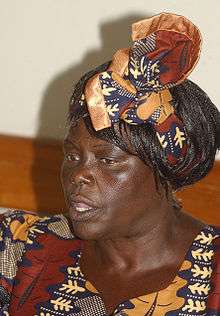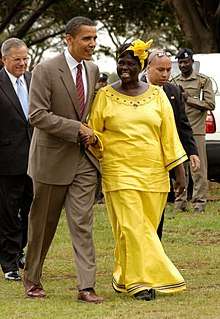
I don't really know why I care so much. I just have something inside me that tells me that there is a problem, and I have got to do something about it.
Wangari Muta Maathai (1 April 1940 – 25 September 2011) was a Kenyan environmental and social activist who was awarded the Nobel Peace Prize of 2004.
Quotes

I am sure it's the same voice that is speaking to everybody on this planet — at least everybody who seems to be concerned about the fate of the world, the fate of this planet.
- I don't really know why I care so much. I just have something inside me that tells me that there is a problem, and I have got to do something about it. I think that is what I would call the God in me.
All of us have a God in us, and that God is the spirit that unites all life, everything that is on this planet. It must be this voice that is telling me to do something, and I am sure it's the same voice that is speaking to everybody on this planet — at least everybody who seems to be concerned about the fate of the world, the fate of this planet.- As quoted in the article Wangari Maathai:"You Strike The Woman ..." by Priscilla Sears; published in the quarterly In Context #28 (Spring 1991)
- I kept stumbling and falling and stumbling and falling as I searched for the good. 'Why?' I asked myself. Now I believe that I was on the right path all along, particularly with the Green Belt Movement, but then others told me that I shouldn't have a career, that I shouldn't raise my voice, that women are supposed to have a master. That I needed to be someone else. Finally I was able to see that if I had a contribution I wanted to make, I must do it, despite what others said. That I was OK the way I was. That it was all right to be strong.
- As quoted in the article Wangari Maathai:"You Strike The Woman ..." by Priscilla Sears in the quarterly In Context #28 (Spring 1991)
- The people are starving. They need food; they need medicine; they need education. They do not need a skyscraper to house the ruling party and a 24-hour TV station.
- On her opposition to the construction of a skyscraper in Nairobi, Kenya, as quoted in the article Wangari Maathai:"You Strike The Woman ..." by Priscilla Sears in the quarterly In Context #28 (Spring 1991)
- I think what the Nobel committee is doing is going beyond war and looking at what humanity can do to prevent war. Sustainable management of our natural resources will promote peace.
- Interview in TIME (10 October 2004)
- As I conclude I reflect on my childhood experience when I would visit a stream next to our home to fetch water for my mother. I would drink water straight from the stream. Playing among the arrowroot leaves I tried in vain to pick up the strands of frogs’ eggs, believing they were beads. But every time I put my little fingers under them they would break. Later, I saw thousands of tadpoles: black, energetic and wriggling through the clear water against the background of the brown earth. This is the world I inherited from my parents. Today, over 50 years later, the stream has dried up, women walk long distances for water, which is not always clean, and children will never know what they have lost. The challenge is to restore the home of the tadpoles and give back to our children a world of beauty and wonder.
- Nobel lecture (10 December 2004)
- Until you dig a hole, you plant a tree, you water it and make it survive, you haven't done a thing. You are just talking.
- Speech at Goldman Awards, San Francisco (24 April 2006)
Quotes about Maathai
- Peace on earth depends on our ability to secure our living environment. Maathai stands at the front of the fight to promote ecologically viable social, economic and cultural development in Kenya and in Africa. She has taken a holistic approach to sustainable development that embraces democracy, human rights and women's rights in particular. She thinks globally and acts locally.
- The Norwegian Nobel Committee official announcement (8 October 2004)
External links
This article is issued from
Wikiquote.
The text is licensed under Creative
Commons - Attribution - Sharealike.
Additional terms may apply for the media files.